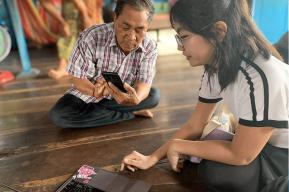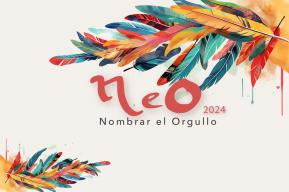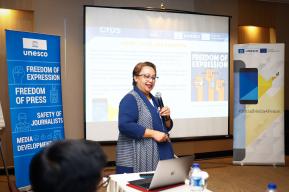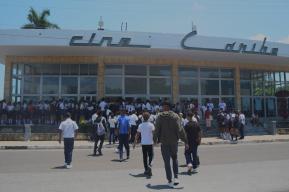Article
L’Oréal-UNESCO For Women in Science Celebrates the Achievements of Young Arab Female Scientists

On 9 February, to mark the International Day of Women and Girls in Science on 11 February, taking place at Expo 2020 Dubai, the Fondation L’Oréal and UNESCO hosted the first For Women in Science Young Talents Awards Ceremony for MENA. The event took place in the Dubai Exhibition Center at Expo 2020 Dubai to honour and recognize 14 Arab female scientists from the MENA region for their groundbreaking research in the fields of Life and Environmental Sciences, Physical sciences, Mathematics and Computer sciences. This programme is part of L’Oréal-UNESCO’s global For Women in Science initiative that has recognized over 3,900 phenomenal researchers and 122 Laureates from more than 110 countries and regions since its inception in 1998.

The Ceremony awarded a total of 14 Young Talents – five from various countries in the GCC, three from Egypt and six from the Levant – in the PhD and post-doctorate categories, underscoring their role in solving today’s challenges as well as inspiring the future generation of females.
The event also welcomed a group of esteemed panellists to discuss how Arab Women scientists are breaking through barriers and inspiring the next generation of leaders and changemakers. The panellists included Dr Anna Paolini, Director of UNESCO Office in Doha and Representative for the Gulf and Yemen, H.E. Dr Nawal Al-Hosany, the Permanent Representative of the UAE to the International Renewable Energy Agency (IRENA), and Rana El Chemaitelly, the Founder and CEO of ‘The Little Engineer’. The panel was moderated by Alexandra Palt, Chief Corporate Responsibility Officer and CEO of the Foundation L’Oréal.
“L’Oréal and UNESCO have been great advocates for the contributions women are making to the STEM sector,” said H.E. Sarah bint Yousef Al Amiri. “By recognizing and rewarding the vital role female scientists play in advancing knowledge in so many fields, they are not only inspiring new generations of young women to pursue careers in science and research but fostering a more inclusive, more representative scientific community.”
“At the Foundation L’Oréal, we are committed to doing our part in creating an equal opportunity environment that enables everyone to reach their full potential”, adds Alexandra Palt, Chief Corporate Responsibility Officer and CEO of the Foundation L’Oréal “Women have shown more than ever that they are necessary in every possible field of research. Their contribution to science is vital as we thrive to build a more sustainable, equitable and inclusive world. But too often, their roles are being limited by gender biases and other obstacles. Through the L’Oréal-UNESCO For Women in Science Program, we aim to improve the representation of women in STEM, to drive global impact by empowering more female scientists to achieve excellence at different stages of their careers and to encourage their participation in solving the great challenges of our time for the benefit of all.”

Link to watch the event: https://virtualexpodubai.com/listen-watch/events/loreal-unesco-for-women-in-science
Over the last 24 years, UNESCO and the Fondation L’Oréal launched the For Women in Science programme to recognize the contribution of Women to the advancement of Sciences, to raise awareness about gender biases in Sciences and to inspire and motivate the new generations to become the change-makers of tomorrow.
So far, this programme has supported and raised the profiles of 112 laureates, including five who have received a Nobel Prize, and more than 3,800 talented young scientists, both at a doctoral and post-doctoral level from over 110 countries.
At the regional level and since its inception in 2010, the L’Oréal-UNESCO For Women in Science Young Talents programme has awarded more than 160 female scientists and 11 Laureates from MENA. Among them, 16 Arab female scientists have also won additional international recognition through the International Rising Talent programme.
We would like to extend our warm congratulations to the winners of 2021, and we look forward to recognizing many more Arab female scientists in the future.
The 2021 L’Oréal-UNESCO For Women in Science Middle East Young Talents are:
PhD students:
- Arij Yehya (Qatar): For her research on identifying factors that drive the widening of the gender gap in personality traits to further evaluate current and future gender policies.
- Halima Alnaqbi (UAE): For her research on enhancing the existing organ transplantation system to include Arab ethnic groups.
- Rachel Njeim (Lebanon): For her research on the contribution of NETosis to the pathogenesis of Diabetic Kidney Disease.
- Sama Hassan Ali Rahmatullah (Iraq): For her research on anti-pollution caused by genetic variation of plants associated with soil contaminated of petroleum hydrocarbons.
- Sarah Abdelkader (Egypt): For her research on on-site sustainable treatment methods for agricultural wastewater treatment to be reused in irrigation.
Post-doctorate researchers:
- Dr. Ghada Dushaq (UAE): For her research on discovering novel materials and structures across photonics to enhance the speed, capacity and accuracy of conventional technologies.
- Dr. Hend Alqaderi (Kuwait): For her research on the use of oral fluids as a non-invasive diagnostic tool for early diagnosis and disease management of COVID-19 and other inflammatory diseases.
- Dr. Nura Adam Mohamed (Qatar): For her research on developing nonconventional, novel therapeutic tools to prevent the development of diabetes mellitus and cardiovascular diseases.
- Dr. Ingy Ibrahim Abdallah (Egypt): For her research on overcoming receptor mutations in cancer targeted therapy.
- Dr. Irene Samy Fahim Gabriel (Egypt): For her research on manufacturing of Sugarcane Bagasse-Based tableware in Egypt.
- Dr. Heba Alzaben (Jordan): For her research on the use of thermal remote sensing to monitor ecosystem health.
- Dr. Hiba N. Rajha (Lebanon): For her research on food waste valorization through incorporation and nanoencapsulation of grape skin polyphenols in various cosmetic products.
- Dr. Nirmeen Elmadany (Palestine): For her research on targeting immunosuppressive proteins in Glioblastoma Microenvironment for a better tumor response to immunotherapy.
- Dr. Waad Saftly (Syria): For her research on galaxy evolution through the history of the universe.








